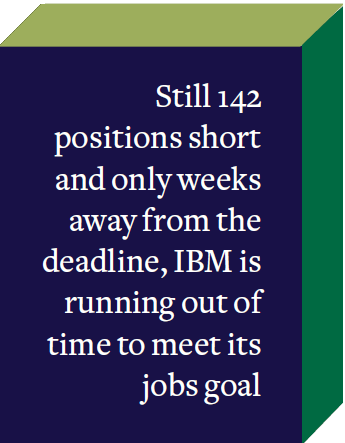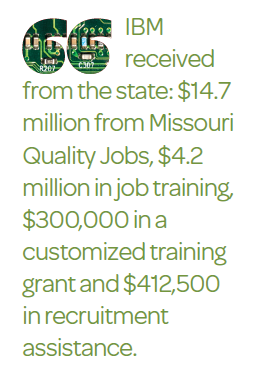Filling the Gap
 WITH LESS THAN TWO MONTH before the main deadline in the deal that brought IBM to Columbia, the company so far is 142 jobs short of its commitment. The company received more than $41.2 million in public assistance from state and local sources, and in return for $8.6 million from the Missouri Department of Economic Development’s BUILD (Business Use Incentives for Large Scale Development) Program, IBM agreed in 2010 to create 600 jobs by the end of December 2012 at its new Technology Service Delivery Center on Lemone Industrial Drive in Columbia.
WITH LESS THAN TWO MONTH before the main deadline in the deal that brought IBM to Columbia, the company so far is 142 jobs short of its commitment. The company received more than $41.2 million in public assistance from state and local sources, and in return for $8.6 million from the Missouri Department of Economic Development’s BUILD (Business Use Incentives for Large Scale Development) Program, IBM agreed in 2010 to create 600 jobs by the end of December 2012 at its new Technology Service Delivery Center on Lemone Industrial Drive in Columbia.
According to DED, the company has only generated 458 jobs so far. DED provided the figure in response to a state Sunshine Law request.
IBM declined to grant an interview or to provide numbers, but a company spokesman responded via email. “We are currently on pace to meet our commitments to the state we agreed to in 2010,” said Scott Cook, an IBM media relations representative.
IT skills and local talent
Might the company be having trouble meeting its employment goal because of a lack of local IT talent? Although IBM’s Cook would not answer that question with specifics, he hinted that such might be the case when he wrote of a national IT skills gap. To combat it, he said that IBM has been working with hundreds of universities to better prepare students with marketable analytics skills.
“The skills challenge in Columbia is not unlike a trending issue that we are seeing across the U.S. and one that we have been working to address,” Cook said via email. “IBM has upwards of 3,000 jobs in big data, analytics and services we have not been able to fill because of the skills gap in the United States. This is one of the reasons we continue to work with universities to bridge the skills gap.”
Project Tiger
Code-named Project Tiger, the effort led by Regional Economic Development Inc. brokered a deal that brought the IBM information technology office. In addition to the $8.6 million in Missouri BUILD Program tax credits, IBM received from the state: $14.7 million from Missouri Quality Jobs, $4.2 million in job training, $300,000 in a customized training grant and $412,500 in recruitment assistance.
Likewise, the city purchased IBM’s building for $3 million and leased it to the company for $1 a year for 10 years — renewable for an extra five years — and a consortium of local banks provided a $10 million loan to the Columbia Area Jobs Foundation to provide funding to refurbish the building, which was purchased from the Lemone Trust. The company also received property tax abatements on the building that allow the company to pay the tax as it was before the improvements were made. The company does pay taxes on the equipment and fixtures, REDI Director Mike Brooks says.
More than jobs
Brooks says a company such as IBM provides a community many benefits besides jobs. Although Cook said his company was unwilling to release the number of employees at its local office, he willingly touted the many charities with which the company’s employees have been involved, including Habitat for Humanity, Tiger Treasures, the Food Bank, Rainbow House, Toys for Tots, the Show-Me State Games and the Salvation Army.
In addition to the funding from the community, Brooks says IBM also showed interest in a number of desirable items that helped close the Project Tiger deal. Three items in particular seemed to appeal to the company, he says, including providing city bus service to the site and lining Lemone Industrial Drive with trees, both of which have been completed. The city’s 104 Red route now loops through the industrial park, and Brooks says trees have been planted.

However, the third item, a connection to Columbia’s system of parks and trails, has run aground of homeowner opposition in the East Pointe neighborhood to the proposed Grindstone Creek Trail, according to Parks and Recreation officials.
Dancing with the deadline
If the company fails to hire 600 workers by the end of December, there is no punishment provision written into the agreement with the city, Brooks says. As for the Missouri BUILD Program, if IBM does not fulfill its commitments regarding the number of new jobs, the tax credits will be reduced accordingly, according to the DED website.
At this point, REDI reports that IBM still maintains that it will reach its goal. “The company is hopeful to reach a plateau of 800 jobs,” Brooks says.


